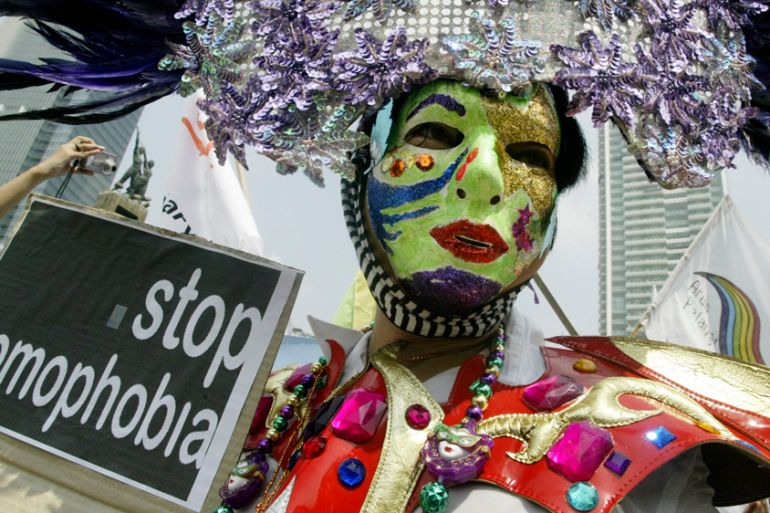Indonesia: Same-sex symbols on messaging apps targeted
Homosexuality is not illegal in Indonesia but is a sensitive issue in the Muslim-majority nation of 250 million people.

Human Rights Watch on Friday urged Indonesian President Joko Widodo to protect gay and lesbian rights, a day after his government told instant messaging apps to remove stickers featuring same-sex couples.
The move was the latest high-profile attempt to discourage visible homosexuality in the socially conservative country.
Keep reading
list of 4 items‘No good evidence’ for gender care for youth over long-term, review finds
Vatican denounces gender-affirming surgery, gender theory and surrogacy
Fears of discrimination in Thailand despite looming same sex marriage bill
In a letter to the president, the New York-based group said that the government should publicly condemn officials who make “grossly discriminatory remarks” against lesbian, gay, bisexual and transgender people. People of such sexualities are commonly known by the abbreviation LGBT.
|
|
| Indonesia’s ‘invisible people’ marginalised |
“President Jokowi should urgently condemn anti-LGBT remarks by officials before such rhetoric opens the door to more abuses,” said Graeme Reid, LGBT rights director at Human Rights Watch. “The president has long championed pluralism and diversity. This is an opportunity to demonstrate his commitment.”
The government move against instant messaging apps comes after a social media backlash against the popular smartphone messaging app Line for having stickers, which are an elaborate type of emoticon, with gay themes in its online store.
The co-ordinating minister for politics, law and security Luhut Pandjaitan told reporters Friday that society should not respond to differences among people with discrimination, social exclusion or violence.
LGBT people “are citizens who have the right to be protected in this dignified nation”, Pandjaitan said. “Don’t be quick to judge people. We must reflect on ourselves first because we cannot guarantee it will not happen to your children and grandchildren in the future.”
Homosexuality is not illegal in Indonesia, but is a sensitive issue in the Muslim-majority nation of more than 250 million people. Official responses range from calls for tolerance to outright condemnation. At the same time, most of Indonesian society, which follows a moderate form of Islam, is tolerant, with gay and transsexual entertainers often appearing on television shows.
Ismail Cawidu, the information and communication ministry spokesman, said on Thursday that social media and messaging platforms should drop stickers expressing support for the LGBT community.
“Social media must respect the culture and local wisdom of the country where they have large numbers of users,” he said.
READ MORE: Unmarried couples caned in Indonesia’s Aceh
Line on Tuesday said it had removed all LGBT-related stickers from its local store after receiving complaints from Indonesian users. Twitter and Facebook had exploded with criticism of Line and its competitor WhatsApp for containing gay content.
Ismail said that the government would tell WhatsApp, which is owned by Facebook, to do the same as Line.
Last month, Muhammad Nasir, the research, technology and higher education minister, said that openly gay students should be banned from the University of Indonesia’s campuses. His statements followed controversy over news that a sexuality research centre planned to offer counselling services for students.
In 2014, politicians in Aceh, a conservative Indonesian province, passed a law that punishes gay sex by public caning and subjects non-Muslims to the region’s strict interpretation of Islamic law.
|
|
| Censorship returns to Indonesia |